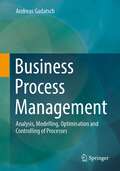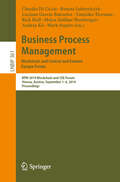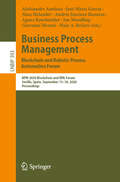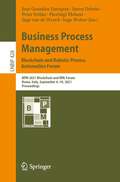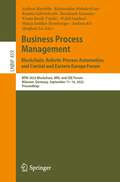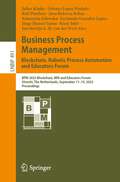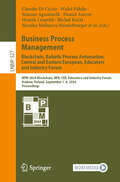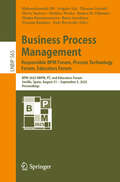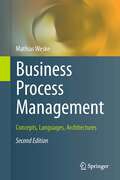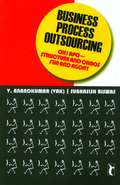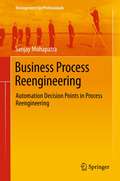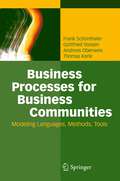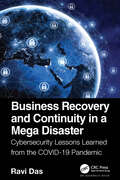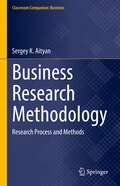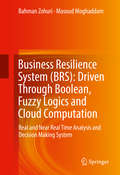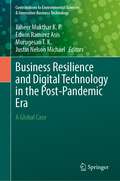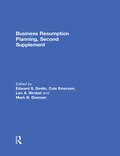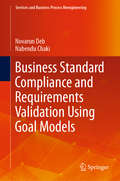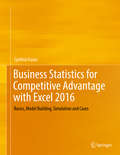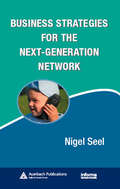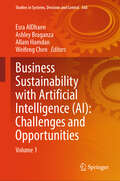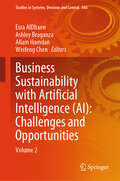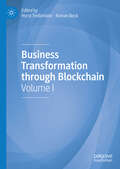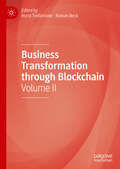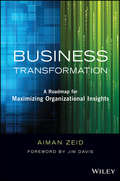- Table View
- List View
Business Process Management: Analysis, Modelling, Optimisation and Controlling of Processes
by Andreas GadatschThis textbook bridges the gap between business management and organisational methods and their digital implementation, because process management increasingly means designing operational tasks. In addition to methodological basics, the work offers many practical examples and exercises. Prof. Gadatsch's book is now considered the "current classic", THE authoritative standard work on IT-supported design of business processes.The tenth edition has been revised and adapted to the requirements of the digital transformation. Process management has evolved greatly due to the trend of digitalisation and as a result of the pandemic. Another related trend is the increased use of Data Science methods for process management, which has been consequently named "Process Science" at scientific conferences. Recent research results published under the heading of "Explorative Process Management" are also of particular importance. They show that the first main phase of process management was rather focused on optimising existing processes and business models. New practical examples were included at various points in the book, for example the migration strategies for the ERP system "SAP S/4 HANA", which is the basis for many industrial and service processes. The chapter on modelling processes was updated and newer methods such as Business Model Canvas were included.
Business Process Management: BPM 2019 Blockchain and CEE Forum, Vienna, Austria, September 1–6, 2019, Proceedings (Lecture Notes in Business Information Processing #361)
by Andrea Kő Mark Staples Claudio Di Ciccio Renata Gabryelczyk Luciano García-Bañuelos Tomislav Hernaus Rick Hull Mojca Indihar ŠtembergerThis book constitutes the contributions presented at the Blockchain Forum and the Central and Eastern Europe Forum (CEE Forum) held at the 17th International Conference on Business Process Management, BPM 2019, which took place in Vienna, Austria, in September 2019.The Blockchain Forum deals with the use of blockchain for collaborative information systems. Conceptual, technical and application-oriented contributions are pursued within the scope of this theme. The Blockchain Forum received a total of 31 submissions; 10 full and 1 short paper were accepted for publication in this book. The objective of the CEE Forum is to foster discussion for BPM academics from Central and Eastern Europe to disseminate their research, compare results and share experiences. For the CEE Forum 16 submissions were received and 6 full and 2 short papers were accepted for publication.The book also contains one invited talk in full-paper length and 6 poster papers from the CEE Forum.
Business Process Management: BPM 2020 Blockchain and RPA Forum, Seville, Spain, September 13–18, 2020, Proceedings (Lecture Notes in Business Information Processing #393)
by Hajo A. Reijers Jan Mendling Giovanni Meroni Aleksandre Asatiani José María García Nina Helander Andrés Jiménez-Ramírez Agnes KoschmiderThis book constitutes the proceedings of the Blockchain and Robotic Process Automation (RPA) Forum which was held as part of the 18th International Conference on Business Process Management, BPM 2020. The conference was planned to take place in Seville, Spain, in September 2020. Due to the COVID-19 pandemic the conference took place virtually.The Blockchain Forum and the RPA Forum have in common that they are centered around an emerging and exciting technology. The blockchain is a sophisticated distributed ledger technology, while RPA software allows for mimicking human, repetitive actions. Each of these have the potential to fundamentally change how business processes are being orchestrated and executed in practice. The BPM community has embraced these technologies as objects of analysis, design, development, and evaluation.The 14 full plus one short paper presented in this volume were carefully reviewed and selected from a total of 28 submissions.
Business Process Management: BPM 2021 Blockchain and RPA Forum, Rome, Italy, September 6–10, 2021, Proceedings (Lecture Notes in Business Information Processing #428)
by Ingo Weber Pierluigi Plebani José González Enríquez Søren Debois Peter Fettke Inge van de WeerdThis book constitutes the proceedings of the Blockchain and RPA Forum, held as part of the 19th International Conference on Business Process Management, BPM 2021, which took place during September 6-10, 2021, in Rome, Italy.The Blockchain Forum and the RPA Forum have in common that they are centered around an emerging and exciting technology. The blockchain is a sophisticated distributed ledger technology, while RPA software allows for mimicking human, repetitive actions. Each of these have the potential to fundamentally change how business processes are being orchestrated and executed in practice. The 8 papers presented in this volume were carefully reviewed and selected from a total of 14 submissions.
Business Process Management: BPM 2022 Blockchain, RPA, and CEE Forum, Münster, Germany, September 11–16, 2022, Proceedings (Lecture Notes in Business Information Processing #459)
by Andrea Kő Walid Gaaloul Raimundas Matulevičius Renata Gabryelczyk Mojca Indihar Štemberger Andrea Marrella Bernhard Axmann Vesna Bosilj Vukšić Qinghua LuThis book constitutes the proceedings of the Blockchain, Robotic Process Management (RPA), and Central and Eastern Europe (CEE) Forum which were held as part of the 20th International Conference on Business Process Management, BPM 2022, which took place in Münster, Germany, during September 11-15, 2022. The Blockchain Forum is dealing with techniques for and applications of blockchains, distributed ledger technologies, and related topics. "The RPA Forum brings together researchers from various communities to discuss challenges, opportunities, and new ideas related to robotic process automation and its application to business processes in private and public sectors." The CEE Forum provides a discussion platform for BPM academics from Central and Eastern Europe to disseminate their research, compare results and share experiences. The 20 papers presented in this volume were carefully reviewed and selected from a total of 40 submissions.
Business Process Management: BPM 2023 Blockchain, RPA and Educators Forum, Utrecht, The Netherlands, September 11–15, 2023, Proceedings (Lecture Notes in Business Information Processing #491)
by Ralf Plattfaut Jorge Munoz-Gama Julius Köpke Orlenys López-Pintado Jana-Rebecca Rehse Katarzyna Gdowska Fernanda Gonzalez-Lopez Koen Smit Jan Martijn E. M. van der WerfThis book constitutes the proceedings of the BPM Forum held at the 21st International Conference on Business Process Management, BPM 2023, which took place in Utrecht, The Netherlands, in September 2023. The Blockchain Forum provided a platform for exploring and discussing innovative ideas on the intersection of BPM and blockchain technology. The RPA Forum focused on the use of the Robotic Process Automation (RPA) in the field of Business Process Management. The Educators Forum brought together educators within the BPM community for sharing resources to improve the practice of teaching BPM-related topics. The 18 full papers included in this volume were carefully reviewed and selected from a total of 39 submissions.
Business Process Management: BPM 2024 Blockchain, RPA, CEE, Educators and Industry Forum, Krakow, Poland, September 1–6, 2024, Proceedings (Lecture Notes in Business Information Processing #527)
by Ralf Plattfaut Claudio Di Ciccio Renata Gabryelczyk Daniel Amyot Henrik Leopold Thomas Grisold Katarzyna Gdowska Monika Malinova Mandelburger Simone Agostinelli Walid Fdhila Michal Krčál Gregor Polančič Katarina Tomičić-Pupek Piotr Sliż Iris BeerepootThis book constitutes the proceedings of the BPM 2024 Blockchain/RPA/CEE/Educators/Industry Forum held at the 22nd International Conference on Business Process Management, BPM 2024, which took place in Krakow, Poland, in September 2024. The Blockchain Forum provided a platform for exploring and discussing innovative ideas on the intersection of BPM and blockchain technology. The CEE Forum deals with BPM research in Central and Eastern European countries, emphasizing the specific challenges due to cultural, political, regional, or organizational differences. The RPA Forum focused on the use of the Robotic Process Automation (RPA) in the field of Business Process Management. The Educators Forum brought together educators within the BPM community for sharing resources to improve the practice of teaching BPM-related topics. The Industry Forum served as a platform connecting academia and industry professionals to exchange real-world experiences and insights on leveraging Business Process Management. The total of 35 papers included in this book was carefully reviewed and selected from a total of 69 papers submitted to these forums.
Business Process Management: BPM 2025 RBPM, PT, and Educators Forum, Seville, Spain, August 31 – September 5, 2025, Proceedings (Lecture Notes in Business Information Processing #565)
by Mathias Weske Flavia Santoro Thomas Grisold Avigdor Gal Dimka Karastoyanova Mahendrawathi Er Remco M. Dijkman Banu Aysolmaz Wasana Bandara Kate RevoredoThis book constitutes the proceedings of the BPM 2025 Responsible BPM Forum, Process Technology Forum, and Educators Forum held at the 23rd International Conference on Business Process Management, BPM 2025, which took place in Seville, Spain, during September 2025. The Responsible Business Process Management (RBPM) Forum provides a platform for exploring how to integrate responsibility into BPM practices, addressing challenges from three perspectives: technological, managerial, and conceptual. The Process Technology Forum covers technical and engineering aspects related to the study, design, development, and maintenance of software systems that support the modeling, simulation, analysis, enactment, and monitoring of business processes. The Educators Forum deals with possibilities to improve BPM teaching in a dynamic and practice-oriented way. The total of 32 papers included in this book was carefully reviewed and selected from a total of 65 papers submitted to these forums.
Business Process Management: Concepts, Languages, Architectures (Lecture Notes in Computer Science #3080)
by Mathias WeskeBusiness process management is usually treated from two different perspectives: business administration and computer science. While business administration professionals tend to consider information technology as a subordinate aspect in business process management for experts to handle, by contrast computer science professionals often consider business goals and organizational regulations as terms that do not deserve much thought but require the appropriate level of abstraction. Matthias Weske argues that all communities involved need to have a common understanding of the different aspects of business process management. To this end, he details the complete business process lifecycle from the modeling phase to process enactment and improvement, taking into account all different stakeholders involved. After starting with a presentation of general foundations and abstraction models, he explains concepts like process orchestrations and choreographies, as well as process properties and data dependencies. Finally, he presents both traditional and advanced business process management architectures, covering, for example, workflow management systems, service-oriented architectures, and data-driven approaches. In addition, he shows how standards like WfMC, SOAP, WSDL, and BPEL fit into the picture. This textbook is ideally suited for classes on business process management, information systems architecture, and workflow management. This 2nd edition contains major updates on BPMN Version 2 process orchestration and process choreographies, and the chapter on BPM methodologies has been completely rewritten. The accompanying website www.bpm-book.com contains further information and additional teaching material.
Business Process Outsourcing
by V. Anandkumar Subhasish BiswasA nascent industry in the 1990s, business process outsourcing (BPO) has taken India by storm. While this industry has been enmeshed in bad press and myths, the fact remains that it has proved to be an engine of economic growth for India over the last one decade. V. Anandkumar (VAK) and Subhasish Biswas have provided an insider's perspective that will be an invaluable read for the 150,000 'BPOites' that enter this industry every year from second and third-tier cities, and to those that are already working in the industry. This in-depth understanding of the BPO industry is also invaluable for business partners and industry leaders-for those who aim to set up a BPO, or for those keen to sustain the workforce in an industry known for its high attrition rate. The authors have dispelled myths while focusing on challenges, opportunities, and solutions from the perspectives of the employee, employer, and customer. How the industry has touched lives of thousands of youth and turned India into a global superpower makes this a compelling read for all those with a wider interest in the power of transformation.
Business Process Reengineering: Automation Decision Points in Process Reengineering (Management for Professionals)
by Sanjay MohapatraBusiness process reengineering (BPR) focuses on redesigning the strategic and value-added processes which transcend the organizational boundaries. It is a cross-functional approach that requires support from almost all the departments of the organization. Business Process Reengineering: Automation Decision Points in Process Reengineering offers a new framework based process reengineering and links it to organization life cycle, process life cycle, and process management. This volume describes the fundamental concepts behind business process reengineering and examines them through case studies, and should appeal to researchers and academics interested in business process reengineering, operations strategy, and organizational restructuring and design.
Business Processes for Business Communities: Modeling Languages, Methods, Tools
by Frank Schönthaler Gottfried Vossen Andreas Oberweis Thomas KarleAfter a brief introduction to the topic of business process modeling, the book offers a quick-start into model-based business process engineering. After that, the foundations of the modeling languages used are conveyed. Meaningful examples are in the foreground - each of the underlying formalisms is treated only as far as needed. Next the Horus Method is described in detail. The book defines a sequence of activities which finally leads to the creation of a complete business process model. The Horus Method, incidentally, is not bound to the use of the Horus software tools. It can be used with other tools or, if necessary, be used even without tool support. Important application fields of business process engineering are described, where the spectrum ranges from business process reengineering to the development and implementation of information systems. The book concludes with an outlook on the future of business process engineering and highlights current research activities in the area.
Business Recovery and Continuity in a Mega Disaster: Cybersecurity Lessons Learned from the COVID-19 Pandemic
by Ravi DasThe COVID-19 pandemic has had so many unprecedented consequences. The great global shift from office work to remote work is one such consequence, with which many information security professionals are struggling. Office workers have been hastily given equipment that has not been properly secured or must use personal devices to perform office work. The proliferation of videoconferencing has brought about new types of cyber-attacks. When the pandemic struck, many organizations found they had no, or old and unworkable, business continuity and disaster recovery plans. Business Recovery and Continuity in a Mega Disaster: Cybersecurity Lessons Learned from the COVID-19 Pandemic reviews the COVID-19 pandemic and related information security issues. It then develops a series of lessons learned from this reviews and explains how organizations can prepare for the next global mega disaster. The following presents some of the key lessons learned: The lack of vetting for third party suppliers and vendors The lack of controls surrounding data privacy, especially as it relates to the personal identifiable information (PPI) data sets The intermingling of home and corporate networks The lack of a secure remote workforce The emergence of supply chain attacks (e.g., Solar Winds) To address the issues raised in these lessons learned, CISOs and their security teams must have tools and methodologies in place to address the following: The need for incident response, disaster recovery, and business continuity plans The need for effective penetration testing The importance of threat hunting The need for endpoint security The need to use the SOAR model The importance of a zero-trust framework This book provides practical coverage of these topics to prepare information security professionals for any type of future disaster. The COVID-19 pandemic has changed the entire world to unprecedented and previously unimaginable levels. Many businesses, especially in the United States, were completely caught off guard, and they had no concrete plans put into place, from a cybersecurity standpoint, for how to deal with this mega disaster. This how-to book fully prepares CIOs, CISOs, and their teams for the next disaster, whether natural or manmade, with the various lessons that have been learned thus far from the COVID-19 pandemic.
Business Research Methodology: Research Process and Methods (Classroom Companion: Business)
by Sergey K. AityanThis book introduces students to major research processes and methods used in business research. The research process includes all steps in the research project beginning from the problem formulation, through research design, proposal, conducting the research, deriving conclusions, writing research report, and preparing and making presentation. The major research methods include risk assessment, statistics, sampling, hypothesis testing, surveys, and comparative analysis. It helps students develop solid knowledge and practical skills sufficient for conducting a research project from its initiation, through completion, and delivery. The author provides multiple examples as well as the questions and problems for self-testing and self-evaluation in each chapter. The book is structured to provide a smooth flow of understanding and learning the material along the learning curve and is concise enough to fit a one-semester course.
Business Resilience System (BRS) (BRS): Real and Near Real Time Analysis and Decision Making System
by Bahman Zohuri Masoud MoghaddamThis book provides a technical approach to a Business Resilience System with its Risk Atom and Processing Data Point based on fuzzy logic and cloud computation in real time. Its purpose and objectives define a clear set of expectations for Organizations and Enterprises so their network system and supply chain are totally resilient and protected against cyber-attacks, manmade threats, and natural disasters. These enterprises include financial, organizational, homeland security, and supply chain operations with multi-point manufacturing across the world. Market shares and marketing advantages are expected to result from the implementation of the system. The collected information and defined objectives form the basis to monitor and analyze the data through cloud computation, and will guarantee the success of their survivability's against any unexpected threats. This book will be useful for advanced undergraduate and graduate students in the field of computer engineering, engineers that work for manufacturing companies, business analysts in retail and e-Commerce, and those working in the defense industry, Information Security, and Information Technology.
Business Resilience and Digital Technology in the Post-Pandemic Era: A Global Case (Contributions to Environmental Sciences & Innovative Business Technology)
by Edwin Ramirez Asis Jaheer Mukthar K.P. Murugesan T. K. Justin Nelson MichaelThis book throws a light on sustainable perspectives of how business entities experienced the turbulent environment in the light of pandemic. The post-pandemic era is characterized by the radical and dramatic changes in the business model, corporate strategies and digital technology. This book provides the academicians, research scholars and corporate professionals with a thought-provoking forum to discuss and deliberate the major trends, opportunities and issues of business entity from the outlook of business resilience, corporate strategy and digital technology in the light of post-pandemic era. The book also suggests suitable measures and strategies for the sustainable development of business entities.
Business Resumption Planning, Second Supplement
by Edward S. Devlin Mark B. Desman Leo A. Wrobel Cole H. EmersonOffering hundreds of tips, templates, checklists, and pointers to information in the public domain, Business Resumption Planning, Second Edition assists you in creating a rock solid recovery plan for any size organization. It provides the information you need in order to coordinate first responders to meet any disaster scenario head on, whether inv
Business Standard Compliance and Requirements Validation Using Goal Models (Services and Business Process Reengineering)
by Nabendu Chaki Novarun DebThis book discusses enterprise hierarchies, which view a target system with varying degrees of abstraction. These requirement refinement hierarchies can be represented by goal models. It is important to verify that such hierarchies capture the same set of rationales and intentions and are in mutual agreement with the requirements of the system being designed. The book also explores how hierarchies manifest themselves in the real world by undertaking a data mining exercise and observing the interactions within an enterprise. The inherent sequence-agnostic property of goal models prevents requirement analysts from performing compliance checks in this phase as compliance rules are generally embedded with temporal information. The studies discussed here seek to extract finite state models corresponding to goal models with the help of model transformation. The i*ToNuSMV tool implements one such algorithm to perform model checking on i* models. In turn, the AFSR framework provides a new goal model nomenclature that associates semantics with individual goals. It also provides a reconciliation machinery that detects entailment or consistency conflicts within goal models and suggests corrective measures to resolve such conflicts. The authors also discuss how the goal maintenance problem can be mapped to the state-space search problem, and how A* search can be used to identify an optimal goal model configuration that is free from all conflicts. In conclusion, the authors discuss how the proposed research frameworks can be extended and applied in new research directions. The GRL2APK framework presents an initiative to develop mobile applications from goal models using reusable code component repositories.
Business Statistics for Competitive Advantage with Excel 2010: Basics, Model Building, Simulation and Cases
by Cynthia FraserExceptional managers know that they can create competitive advantages by basing decisions on performance response under alternative scenarios. To create these advantages, managers need to understand how to use statistics to provide information on performance response under alternative scenarios. This updated edition of the popular text helps business students develop competitive advantages for use in their future careers as decision makers. Students learn to build models using logic and experience, produce statistics using Excel 2010 with shortcuts, and translate results into implications for decision makers. The author emphasizes communicating results effectively in plain English and with compelling graphics in the form of memos and PowerPoints. Statistics, from basics to sophisticated models, are illustrated with examples using real data such as students will encounter in their roles as managers. A number of examples focus on business in emerging global markets with particular emphasis on China and India. Results are linked to implications for decision making with sensitivity analyses to illustrate how alternate scenarios can be compared. Chapters include screenshots to make it easy to conduct analyses in Excel 2010 with time-saving shortcuts expected in the business world. PivotTables and PivotCharts, used frequently in businesses, are introduced from the start. Monte Carlo simulation is introduced early, as a tool to illustrate the range of possible outcomes from decision makers' assumptions and underlying uncertainties. Model building with regression is presented as a process, adding levels of sophistication, with chapters on multicollinearity and remedies, forecasting and model validation, autocorrelation and remedies, indicator variables to represent segment differences, and seasonality, structural shifts or shocks in time series models. Special applications in market segmentation and portfolio analysis are offered, and an introduction to conjoint analysis is included. Nonlinear models are motivated with arguments of diminishing or increasing marginal response, and a chapter on logit regression models introduces models of market share or proportions. The Second Edition includes more explanation of hypothesis tests and confidence intervals, how t, F, and chi square distributions behave. The Data Files, Solution Files, and Chapter PowerPoints: The data files for text examples, cases, lab problems and assignments are stored on Blackboard and may be accessed using this link:https://blackboard.comm.virginia.edu/webapps/portal/frameset.jsp Instructors can gain access to the files, as well as solution files and chapter PowerPoints by registering on the Springer site: http://www.springer.com/statistics/business%2C+economics+%26+finance/book/978-1-4419-9856-9?changeHeader Business people can gain access to the files by emailing the author cfg8q@virginia.edu. https://blackboard.comm.virginia.edu/webapps/portal/frameset.jsp Instructors can gain access to the files, as well as solution files and chapter PowerPoints by registering on the Springer site: http://www.springer.com/statistics/business%2C+economics+%26+finance/book/978-1-4419-9856-9?changeHeader Business people can gain access to the files by emailing the author cfg8q@virginia.edu.
Business Strategies for the Next-Generation Network (Informa Telecoms And Media Ser.)
by Nigel SeelCarriers and service providers have united around the concept of the Next-Generation Network (NGN). Although leveraging a broad basket of Internet technologies, the NGN is not being planned as the next-generation Internet. In its intention and architecture, it is more accurately described as Broadband-ISDN release 2.0. The NGN transition
Business Sustainability with Artificial Intelligence: Volume 1 (Studies in Systems, Decision and Control #568)
by Weifeng Chen Allam Hamdan Esra AlDhaen Ashley BraganzaWith the recent development of Artificial Intelligence (AI), businesses are urged to consider innovation while applying digital transformation. Depending on the nature of the businesses, it is found that innovative digital transformation is required with the use of Artificial Intelligence. However, the future of AI in businesses is yet unclear, the question is it true that without digital transformation businesses are no longer sustainable? Researchers argue that digital transformation could be an opportunity for business to create a global brand however several implications and challenges should be considered including governance and responsible digital management. This book explores how businesses could benefit from AI and leverage technologies to sustain businesses, and the book covers different technological and business-related issues including ethical use and cultural sensitivity of data used in businesses, managing data privacy and protection, governance standards for digital transformation, executive leadership strategic decisions, business innovation, and sustainability. The book is authored by leading experts in the field of AI, digitalization, and business innovation and sustainability, and the author’s diversity reflects quality of research with high level of impact in the research topic. It is written in accessible language that makes it easy for business leaders, researchers, policymakers, and anyone interested in the future of business development to understand the complex concepts and ideas presented in the book. This book provides insight for executive leaders in setting new innovative strategies toward leveraging AI in business at different levels of operations to support business sustainability. The book provides different theoretical and practical practices and case studies that could be used as a guideline for policy making and devising innovative directions.
Business Sustainability with Artificial Intelligence: Volume 2 (Studies in Systems, Decision and Control #566)
by Weifeng Chen Allam Hamdan Esra AlDhaen Ashley BraganzaThis book covers different technological and business-related issues including ethical use and cultural sensitivity of data used in businesses, managing data privacy and protection, governance standards for digital transformation, executive leadership strategic decisions, and business innovation and sustainability. With the recent development of artificial intelligence (AI), businesses are urged to consider innovation while applying digital transformation. Depending on the nature of the businesses, it is found that innovative digital transformation is required with the use of artificial intelligence. However, the future of AI in businesses is yet unclear, the question is it true that without digital transformation businesses are no longer sustainable? Researchers argue that digital transformation could be an opportunity for business to create a global brand however several implications and challenges should be considered including governance and responsible digital management. This book explores how businesses could benefit from AI and leverage technologies to sustain businesses. The book is authored by leading experts in the field of AI, digitalization, and business innovation and sustainability; the author’s diversity reflects quality of research with high level of impact in the research topic. It is written in accessible language that makes it easy for business leaders, researchers, policymakers, and anyone interested in the future of business development to understand the complex concepts and ideas presented in the book. This book provides insight for executive leaders in setting new innovative strategies toward leveraging AI in business at different levels of operations to support business sustainability. The book provides different theoretical and practical practices and case studies that could be used as a guideline for policy making and devising innovative directions.
Business Transformation through Blockchain: Volume I
by Roman Beck Horst TreiblmaierThis edited collection offers a number of contributions from leading scholars investigating Blockchain and its implications for business. Focusing on the transformation of the overall value chain, the sections cover the foundations of Blockchain, its drivers and barriers, business modelling and a range of examples from industry. Using a number of theoretical and methodological approaches, this innovative publication aims to further the cause of this ground-breaking technology and its use within information technology, supply chain and wider business management research.
Business Transformation through Blockchain: Volume II
by Roman Beck Horst TreiblmaierThe second volume of this edited collection offers a number of contributions from leading scholars investigating Blockchain and its implications for business. Focusing on the transformation of the overall value chain, the sections cover the foundations of Blockchain and its sustainability, social and legal applications. It features a variety of use cases, from tourism to healthcare. Using a number of theoretical and methodological approaches, this innovative publication aims to further the cause of this ground-breaking technology and its use within information technology, supply chain and wider business management research.
Business Transformation: A Roadmap for Maximizing Organizational Insights
by Jim Davis Aiman ZeidEffectively introduce and promote analytics within your enterprise All companies use information to set strategies and accomplish business objectives. But how many CEOs and CIOs would say they are satisfied that their companies get maximum value from information? Business Transformation reveals how SAS's Information Evolution Model (IEM) can be used together with analytics for groundbreaking results. Author Aiman Zeid provides the necessary information you need to introduce and promote the use of analytics and insight across your organization. Along with examples and best practices of global companies that have successfully been through this process, you'll learn how to identify the starting point and develop a road map for execution. Reveals how to introduce and promote the use of analytics and insights across your organization Written by a lead developer at SAS global Business Intelligence Competency Center program and services Features global case studies and examples Practical and insightful, this reference provides businesses with an essential blueprint for creating improvements that optimize business returns and put the potential of data analytics to work.
